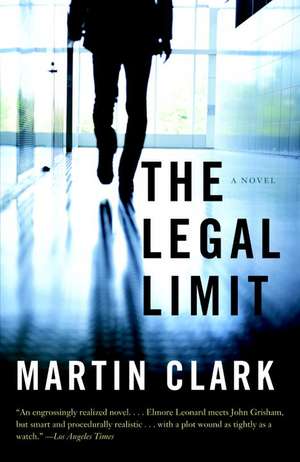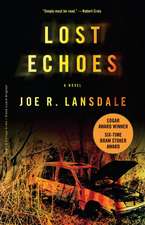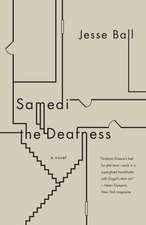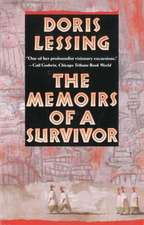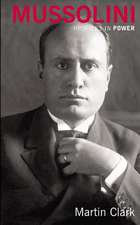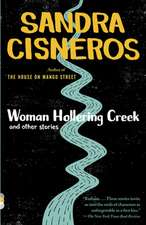The Legal Limit: Vintage Contemporaries
Autor Martin Clarken Limba Engleză Paperback – 31 mai 2009
Intricately plotted and relentlessly entertaining, The Legal Limit is an exploration of the judicial system's roughest edges, as well as a gripping story of murder, family, and the difficult divide that sometimes separates genuine justice from the law.
Din seria Vintage Contemporaries
-
 Preț: 131.90 lei
Preț: 131.90 lei -
 Preț: 101.04 lei
Preț: 101.04 lei -
 Preț: 118.98 lei
Preț: 118.98 lei -
 Preț: 106.66 lei
Preț: 106.66 lei -
 Preț: 99.59 lei
Preț: 99.59 lei -
 Preț: 96.21 lei
Preț: 96.21 lei -
 Preț: 110.68 lei
Preț: 110.68 lei -
 Preț: 95.80 lei
Preț: 95.80 lei -
 Preț: 105.03 lei
Preț: 105.03 lei -
 Preț: 91.10 lei
Preț: 91.10 lei -
 Preț: 111.09 lei
Preț: 111.09 lei -
 Preț: 117.00 lei
Preț: 117.00 lei -
 Preț: 115.07 lei
Preț: 115.07 lei -
 Preț: 112.72 lei
Preț: 112.72 lei -
 Preț: 100.82 lei
Preț: 100.82 lei -
 Preț: 107.29 lei
Preț: 107.29 lei -
 Preț: 114.58 lei
Preț: 114.58 lei -
 Preț: 105.27 lei
Preț: 105.27 lei -
 Preț: 87.19 lei
Preț: 87.19 lei -
 Preț: 89.96 lei
Preț: 89.96 lei -
 Preț: 96.43 lei
Preț: 96.43 lei -
 Preț: 98.86 lei
Preț: 98.86 lei -
 Preț: 96.21 lei
Preț: 96.21 lei -
 Preț: 98.57 lei
Preț: 98.57 lei -
 Preț: 124.29 lei
Preț: 124.29 lei -
 Preț: 102.97 lei
Preț: 102.97 lei -
 Preț: 100.24 lei
Preț: 100.24 lei -
 Preț: 100.00 lei
Preț: 100.00 lei -
 Preț: 88.43 lei
Preț: 88.43 lei -
 Preț: 100.41 lei
Preț: 100.41 lei -
 Preț: 100.50 lei
Preț: 100.50 lei -
 Preț: 124.20 lei
Preț: 124.20 lei -
 Preț: 88.84 lei
Preț: 88.84 lei -
 Preț: 123.00 lei
Preț: 123.00 lei -
 Preț: 138.58 lei
Preț: 138.58 lei -
 Preț: 89.69 lei
Preț: 89.69 lei -
 Preț: 105.66 lei
Preț: 105.66 lei -
 Preț: 101.13 lei
Preț: 101.13 lei -
 Preț: 107.11 lei
Preț: 107.11 lei -
 Preț: 76.45 lei
Preț: 76.45 lei -
 Preț: 110.94 lei
Preț: 110.94 lei -
 Preț: 95.22 lei
Preț: 95.22 lei -
 Preț: 111.28 lei
Preț: 111.28 lei -
 Preț: 83.32 lei
Preț: 83.32 lei -
 Preț: 128.08 lei
Preț: 128.08 lei -
 Preț: 112.92 lei
Preț: 112.92 lei -
 Preț: 105.27 lei
Preț: 105.27 lei -
 Preț: 104.62 lei
Preț: 104.62 lei -
 Preț: 99.83 lei
Preț: 99.83 lei -
 Preț: 99.02 lei
Preț: 99.02 lei
Preț: 114.33 lei
Nou
Puncte Express: 171
Preț estimativ în valută:
21.89€ • 22.56$ • 18.37£
21.89€ • 22.56$ • 18.37£
Carte disponibilă
Livrare economică 01-15 februarie
Preluare comenzi: 021 569.72.76
Specificații
ISBN-13: 9780307388667
ISBN-10: 0307388662
Pagini: 402
Dimensiuni: 135 x 201 x 22 mm
Greutate: 0.31 kg
Editura: Vintage Books USA
Seria Vintage Contemporaries
ISBN-10: 0307388662
Pagini: 402
Dimensiuni: 135 x 201 x 22 mm
Greutate: 0.31 kg
Editura: Vintage Books USA
Seria Vintage Contemporaries
Notă biografică
Martin Clark, a circuit court judge, lives in Stuart, Virginia. His first novel, The Many Aspects of Mobile Home Living, was a New York Times Notable Book, a selection of the Book-of-the-Month Club, a finalist for the Stephen Crane First Fiction Award, and appeared on several best-seller lists.
Extras
The shooting came in October 1984, abrupt and rash, a quicksilver bang.
The day it happened, Mason Hunt had spent most of his morning settled into the afghan-covered recliner at his mother’s house, watching a nondescript brown and tan and gray wren fly against the big den window again and again as it tried to punch through the glass, the bird evidently sickly or a bona fide lunatic, remaining behind while its kin abandoned Virginia and migrated farther south. Despite the suicidal thumps and flutters that gained it nothing and left it pitifully outside its hope, the misguided bird never learned a lesson or gave up on its headlong, full-steam shortcut to sanctuary, never stopped, kept at the foolishness for hours. Mason was home from his final year of law school, visiting his mother and enjoying her flapjacks and rich casseroles for a weekend, waiting for his older brother, Gates, to arrive so they could saw up a maple tree that had blown over in the front yard and stack it into winter firewood. By the time Gates pulled in the gravel drive at eleven thirty, Mason had finished two cups of coffee, napped, read three issues of the Stuart Enterprise and carted the kerosene heater from the basement to its spot near the couch, even though there was no fuel in it and the weather wouldn’t turn cold for another month or so. Soon after he heard Gates cut his Corvette’s ignition, Mason noticed that the bird had quit its sallies and was stuck in a holly bush next to the window, one wing draped across a run of green, prickly leaves, its beak gapped, its head listing and its feet dangling, unable to take hold of anything.
Gates opened the mudroom door but didn’t move too far past the threshold, let out his neck like a terrapin leaving its armor to get a better view of Mason and his mother. “Hello, Mama,” he said in a voice a few notches above normal.
“Gates,” she said, not looking up from her kitchen work. She was peeling green baking apples, circling off the skin in deft turns and cuts that went from stem to bottom without a hitch.
“What’re you cooking?” he asked, leaning against the doorjamb.
“A pie.” The two words were absolutely neutral, ciphers. “The phone not workin’ where you were at last night?”
“I’m sorry; I know I promised I’d call when I can’t make it home. You forgive me?”
“It’s common courtesy, Gates—if you’re living under my roof you could at least let me know where you are. Twenty-seven years old, and it’s the only thing I ask from you.”
“It won’t happen again.”
“Perhaps you should ground him or take away TV privileges,” Mason joked, trying to lighten the mood.
“There you go,” Gates said. “That’ll keep me on the straight and narrow.”
“You ready to get started?” Mason asked, bending over to retie his shoes.
“Sure. Yep. Ready, ready, ready. Ready as can be.” Gates was wearing a Washington Redskins jersey with the name “Hunt” stenciled across the back in gold block letters. Five inches over six feet tall, he didn’t fit well into the doorframe. “Mason, man, I need you to run an errand with me before we take care of the tree, and then we’re right back here lickety-split.” He glanced at their mother. She still didn’t look in his direction.
“An errand?” Mason repeated.
“You boys be careful with the saw,” Sadie Grace Hunt said from the kitchen. “Chain saws are dangerous, Gates.” She finally made eye contact with him.
“Yes, ma’am,” Gates answered. “You don’t need to worry about us.”
“And if you’re goin’ somewhere with Mason”—she held the paring knife in front of her, pointing it at the ceiling—“you let him drive, you hear?”
“If it’ll make you happy, then I’d be delighted to have my little brother chauffeur me around.” He winked at Mason, promised his mom he’d be back for a piece of warm pie and headed out the door.
Mason was a large man as well, two inches shorter than his brother and not as thick through the shoulders and trunk, but substantial enough that the Corvette’s passenger seat was uncomfortable. The shape hit him all wrong, and he had trouble with his knees. He didn’t attempt the safety belt. “Damn, Gates, what—you just start distilling the hooch in your car, cut out the middleman? It smells like a speakeasy in here.” There was a plastic Star Wars cup—a faded fast-food giveaway—resting on the console; the contents were yellowish green, SunDrop and vodka without any ice to dilute the potency.
“I’ll roll the windows down and drive real fast.” Gates nudged a cassette with his index finger and a mechanism eased it from sight, inhaling it into the dash. He had recorded a Huey Lewis and the News album onto the tape, and “I Want a New Drug” came on mid-refrain. “While we’re on the subject, can I offer you a little nip?” he asked. “I’ve got vodka and a bottle of Wild Turkey Denny gave me for my birthday.”
“I’ll pass,” Mason said. “Thanks just the same. It’s a bit early, isn’t it?” The question didn’t have any bite in it, wasn’t a rebuke. He grinned at his brother.
“I’m grandfathered in for the entire day, a carryover from last night. So long as you don’t stop, it’s just a continuation, not the same as drinking for breakfast or somethin’ pathetic and alcoholic.” Remarkably, besides the odor and a few aggravated blood vessels in his eyes, Gates seemed fairly level. An occasional syllable was spit-heavy, but that was about it. “Our pal Robbie Hanes is leavin’ for the Navy, so we had a throwdown yesterday for him at the Woolwine Ruritan building. That’s why I’m behind schedule—the party took us hostage and wouldn’t let us go.”
“I’d have never pegged Robbie for duty on the high seas.”
Gates reached under his seat and located a Crown Royal bag, a deep-purple felt sack with bold yellow stitching and matching yellow drawstrings. He set the bag in his lap and took out a vial of cocaine and an elaborate spoon, the spoon either silver or pewter, in the shape of a mermaid, her hair serving as a grip, her toes clutching a tiny scoop. “I need to boost my shit, brother. I’m assuming you’re still not interested?”
“If I tried it, I’d probably like it way too much. In no time at all, I’d be pissing myself and scavenging butts from ashtrays at the bus terminal. Quoting Timmy Leary at the homeless shelter. Thanks just the same.” Mason turned down the music. “Perhaps we’d be wise to get out of Mom’s sight before you start doing that.”
“Only take a sec.” Gates dipped the spoon into the powder, raised it to his nose and snorted—hard—three times.
“By the way, why does everyone I know carry his dope in a Crown Royal bag? Or the cassette cover for an Allman Brothers tape? Can you explain that to me? I think the Supreme Court’s decided the cops have probable cause to search whenever they spot either of those in a car, regardless of the circumstances.”
“You have a better suggestion?” Gates wiped his nose, then sipped his drink. “The bag’s a pretty damn fine creation.”
“True. Can’t argue with you there.”
“You like the album?” Gates asked. “Huey Lewis and the News?”
“Yeah. It’s okay, though it’s a shame they don’t get any more airtime than they do. And I always feel like Huey might be sort of pulling our leg musically.”
“Too much schoolin’, I’m sorry to say, has made you into a boring smart-ass.” Gates fired the engine and they crept down the gravel drive, the car chugging and straining in first gear, the tachometer barely registering because Gates didn’t want to risk nicking the paint with kicked-up gravel.
“Where’re we going?” Mason asked. “What kind of mischief are you dragging me into?”
“Nothing too tough, I promise. Robbie’s leavin’ behind a nice dresser, and he said I could have it. You and me are going to meet Claude and him in Woolwine, load the dresser onto Claude’s pickup and haul it to Denise’s trailer.”
“How are you two doing? You and Denise, I mean?”
“Everything’s cool. She got a promotion at work—off the floor and into the office—and she finally finished her associate’s degree. Looks like a million bucks, still crazy about me.” He made a goofy face after the last declaration. “We’re thinkin’ about maybe considering buying a house together. The old Mabe home is for sale. I love that place—it’s on five acres, has a nice pond and a humongous porch for cookouts and warm-weather drinkin’. Man, you could just put the speakers in the windows, grill a steak, invite friends by. Only problem is that I need my luck to improve so I can pull my part, you know? I’m hopin’ this insurance job with State Farm comes through, so I can quit living fuckin’ hand to mouth.”
“Good for you. I think the world of her.”
“Me too.”
Mason wanted to maneuver more space for his knees and shins, but the seat was at its limit, had no play in it. “It’ll take us two hours to drive to Woolwine, load the dresser, then drive to Denise’s and unload, don’t you figure?” He wriggled into a new position.
“Close to it. You can call Mom from Robbie’s and give her an update.” Gates sniffed and touched his nostrils with the back of his hand. “So long as we have the tree done by dark, we should be okay.”
“We have all morning tomorrow if we need it,” Mason said, flashing his brother a wry smile.
It took them several minutes to cover the half mile of dirt and stone that led to the blacktop, but Gates slammed the accelerator the moment the wheels touched the asphalt, causing the car’s tires to spin and the rear end to break traction.
They met their friends and wrapped the piece of furniture in an old quilt and laid it in the bed of Claude’s pickup. Before they started to Denise’s, Robbie warmed barbecued pig and baked beans, left over from his party. He placed the food on the tailgate of the truck, and they all dug it straight out of tinfoil tubs with plastic forks and wiped their hands and faces on paper towels. Gates poured himself another mixed drink, and the other three men popped cold Miller beers. The truck’s doors were open, the radio playing, the hardwood trees in southside Virginia turning crimson, yellow and fire-orange, an occasional dry, brownish leaf sifting through the air on its way to the ground.
Denise’s mobile home was in Five Forks on a small parcel of land she was buying from her uncle. She was a hard worker and a smart, solid woman with restraint and sensible tastes uncommon for her circumstances, and she kept her yard and dwelling neat. Mums and azaleas and other flowers and bushes that Mason couldn’t identify were planted here and there, the grass was still green and nicely trimmed, and the property was free of birdbaths, kitschy cement animals, busted lawn chairs, junked Monte Carlos and matted cur dogs chained to a rusted post. Gates had helped her build and stain a covered deck; a single dragonfly wind chime hung from the four-by-four that supported the tacked-on roof, a friendly jack-o’-lantern welcomed visitors from the top step. Denise’s white Celica was parked in the drive, a Mazda RX-7 behind it, and the moment Gates saw the Mazda he became angry.
“Damn,” he snapped.
“What?” Mason peered across the interior at his brother. “What’s wrong?”
“That’s Wayne Thompson’s car.”
As Mason understood it, there had been a period when Gates and Denise, romantic since high school, had separated for a number of months. After Gates walked away from Virginia Tech, and after he failed to catch on with the Redskins, and after he declined a plum job at Masonite—human resources, a gig with dress shoes and a coffee mug, for heaven’s sakes—and after he barely squirmed out of a DWI over in North Carolina, and after Denise allowed as to how—six years removed from his graduation—he needed to find work, quit freeloading at his mother’s house and stop lollygagging around in the Corvette for hours on end, and after she finally gave him a deadline he spitefully ignored, after all this considerable forbearance, she sent him packing and began dating Wayne Thompson. Gates quickly enrolled in real estate school and signed a lease at the Dorn Williams apartment complex, begrudged measures that lasted just long enough to tamp down Denise’s ire but were sufficient to spark their reconciliation. At least he’d tried, she told friends who poor-mouthed her boyfriend and suggested she was making a mistake by offering him yet another chance.
There was also small-town scuttlebutt that Denise had slipped a time or two or three or five since reconciling with Gates, talk that she’d been spotted at the Tanglewood Beach Music Festival with Wayne or got– ten hooted with her girlfriends and mentioned him favorably or been seen picking up her car—early in the morning—from the elementary school parking lot not far from his house. And who could blame her, given what Gates had to offer and his headstrong, good-for-nothing nature?
From the Hardcover edition.
The day it happened, Mason Hunt had spent most of his morning settled into the afghan-covered recliner at his mother’s house, watching a nondescript brown and tan and gray wren fly against the big den window again and again as it tried to punch through the glass, the bird evidently sickly or a bona fide lunatic, remaining behind while its kin abandoned Virginia and migrated farther south. Despite the suicidal thumps and flutters that gained it nothing and left it pitifully outside its hope, the misguided bird never learned a lesson or gave up on its headlong, full-steam shortcut to sanctuary, never stopped, kept at the foolishness for hours. Mason was home from his final year of law school, visiting his mother and enjoying her flapjacks and rich casseroles for a weekend, waiting for his older brother, Gates, to arrive so they could saw up a maple tree that had blown over in the front yard and stack it into winter firewood. By the time Gates pulled in the gravel drive at eleven thirty, Mason had finished two cups of coffee, napped, read three issues of the Stuart Enterprise and carted the kerosene heater from the basement to its spot near the couch, even though there was no fuel in it and the weather wouldn’t turn cold for another month or so. Soon after he heard Gates cut his Corvette’s ignition, Mason noticed that the bird had quit its sallies and was stuck in a holly bush next to the window, one wing draped across a run of green, prickly leaves, its beak gapped, its head listing and its feet dangling, unable to take hold of anything.
Gates opened the mudroom door but didn’t move too far past the threshold, let out his neck like a terrapin leaving its armor to get a better view of Mason and his mother. “Hello, Mama,” he said in a voice a few notches above normal.
“Gates,” she said, not looking up from her kitchen work. She was peeling green baking apples, circling off the skin in deft turns and cuts that went from stem to bottom without a hitch.
“What’re you cooking?” he asked, leaning against the doorjamb.
“A pie.” The two words were absolutely neutral, ciphers. “The phone not workin’ where you were at last night?”
“I’m sorry; I know I promised I’d call when I can’t make it home. You forgive me?”
“It’s common courtesy, Gates—if you’re living under my roof you could at least let me know where you are. Twenty-seven years old, and it’s the only thing I ask from you.”
“It won’t happen again.”
“Perhaps you should ground him or take away TV privileges,” Mason joked, trying to lighten the mood.
“There you go,” Gates said. “That’ll keep me on the straight and narrow.”
“You ready to get started?” Mason asked, bending over to retie his shoes.
“Sure. Yep. Ready, ready, ready. Ready as can be.” Gates was wearing a Washington Redskins jersey with the name “Hunt” stenciled across the back in gold block letters. Five inches over six feet tall, he didn’t fit well into the doorframe. “Mason, man, I need you to run an errand with me before we take care of the tree, and then we’re right back here lickety-split.” He glanced at their mother. She still didn’t look in his direction.
“An errand?” Mason repeated.
“You boys be careful with the saw,” Sadie Grace Hunt said from the kitchen. “Chain saws are dangerous, Gates.” She finally made eye contact with him.
“Yes, ma’am,” Gates answered. “You don’t need to worry about us.”
“And if you’re goin’ somewhere with Mason”—she held the paring knife in front of her, pointing it at the ceiling—“you let him drive, you hear?”
“If it’ll make you happy, then I’d be delighted to have my little brother chauffeur me around.” He winked at Mason, promised his mom he’d be back for a piece of warm pie and headed out the door.
Mason was a large man as well, two inches shorter than his brother and not as thick through the shoulders and trunk, but substantial enough that the Corvette’s passenger seat was uncomfortable. The shape hit him all wrong, and he had trouble with his knees. He didn’t attempt the safety belt. “Damn, Gates, what—you just start distilling the hooch in your car, cut out the middleman? It smells like a speakeasy in here.” There was a plastic Star Wars cup—a faded fast-food giveaway—resting on the console; the contents were yellowish green, SunDrop and vodka without any ice to dilute the potency.
“I’ll roll the windows down and drive real fast.” Gates nudged a cassette with his index finger and a mechanism eased it from sight, inhaling it into the dash. He had recorded a Huey Lewis and the News album onto the tape, and “I Want a New Drug” came on mid-refrain. “While we’re on the subject, can I offer you a little nip?” he asked. “I’ve got vodka and a bottle of Wild Turkey Denny gave me for my birthday.”
“I’ll pass,” Mason said. “Thanks just the same. It’s a bit early, isn’t it?” The question didn’t have any bite in it, wasn’t a rebuke. He grinned at his brother.
“I’m grandfathered in for the entire day, a carryover from last night. So long as you don’t stop, it’s just a continuation, not the same as drinking for breakfast or somethin’ pathetic and alcoholic.” Remarkably, besides the odor and a few aggravated blood vessels in his eyes, Gates seemed fairly level. An occasional syllable was spit-heavy, but that was about it. “Our pal Robbie Hanes is leavin’ for the Navy, so we had a throwdown yesterday for him at the Woolwine Ruritan building. That’s why I’m behind schedule—the party took us hostage and wouldn’t let us go.”
“I’d have never pegged Robbie for duty on the high seas.”
Gates reached under his seat and located a Crown Royal bag, a deep-purple felt sack with bold yellow stitching and matching yellow drawstrings. He set the bag in his lap and took out a vial of cocaine and an elaborate spoon, the spoon either silver or pewter, in the shape of a mermaid, her hair serving as a grip, her toes clutching a tiny scoop. “I need to boost my shit, brother. I’m assuming you’re still not interested?”
“If I tried it, I’d probably like it way too much. In no time at all, I’d be pissing myself and scavenging butts from ashtrays at the bus terminal. Quoting Timmy Leary at the homeless shelter. Thanks just the same.” Mason turned down the music. “Perhaps we’d be wise to get out of Mom’s sight before you start doing that.”
“Only take a sec.” Gates dipped the spoon into the powder, raised it to his nose and snorted—hard—three times.
“By the way, why does everyone I know carry his dope in a Crown Royal bag? Or the cassette cover for an Allman Brothers tape? Can you explain that to me? I think the Supreme Court’s decided the cops have probable cause to search whenever they spot either of those in a car, regardless of the circumstances.”
“You have a better suggestion?” Gates wiped his nose, then sipped his drink. “The bag’s a pretty damn fine creation.”
“True. Can’t argue with you there.”
“You like the album?” Gates asked. “Huey Lewis and the News?”
“Yeah. It’s okay, though it’s a shame they don’t get any more airtime than they do. And I always feel like Huey might be sort of pulling our leg musically.”
“Too much schoolin’, I’m sorry to say, has made you into a boring smart-ass.” Gates fired the engine and they crept down the gravel drive, the car chugging and straining in first gear, the tachometer barely registering because Gates didn’t want to risk nicking the paint with kicked-up gravel.
“Where’re we going?” Mason asked. “What kind of mischief are you dragging me into?”
“Nothing too tough, I promise. Robbie’s leavin’ behind a nice dresser, and he said I could have it. You and me are going to meet Claude and him in Woolwine, load the dresser onto Claude’s pickup and haul it to Denise’s trailer.”
“How are you two doing? You and Denise, I mean?”
“Everything’s cool. She got a promotion at work—off the floor and into the office—and she finally finished her associate’s degree. Looks like a million bucks, still crazy about me.” He made a goofy face after the last declaration. “We’re thinkin’ about maybe considering buying a house together. The old Mabe home is for sale. I love that place—it’s on five acres, has a nice pond and a humongous porch for cookouts and warm-weather drinkin’. Man, you could just put the speakers in the windows, grill a steak, invite friends by. Only problem is that I need my luck to improve so I can pull my part, you know? I’m hopin’ this insurance job with State Farm comes through, so I can quit living fuckin’ hand to mouth.”
“Good for you. I think the world of her.”
“Me too.”
Mason wanted to maneuver more space for his knees and shins, but the seat was at its limit, had no play in it. “It’ll take us two hours to drive to Woolwine, load the dresser, then drive to Denise’s and unload, don’t you figure?” He wriggled into a new position.
“Close to it. You can call Mom from Robbie’s and give her an update.” Gates sniffed and touched his nostrils with the back of his hand. “So long as we have the tree done by dark, we should be okay.”
“We have all morning tomorrow if we need it,” Mason said, flashing his brother a wry smile.
It took them several minutes to cover the half mile of dirt and stone that led to the blacktop, but Gates slammed the accelerator the moment the wheels touched the asphalt, causing the car’s tires to spin and the rear end to break traction.
They met their friends and wrapped the piece of furniture in an old quilt and laid it in the bed of Claude’s pickup. Before they started to Denise’s, Robbie warmed barbecued pig and baked beans, left over from his party. He placed the food on the tailgate of the truck, and they all dug it straight out of tinfoil tubs with plastic forks and wiped their hands and faces on paper towels. Gates poured himself another mixed drink, and the other three men popped cold Miller beers. The truck’s doors were open, the radio playing, the hardwood trees in southside Virginia turning crimson, yellow and fire-orange, an occasional dry, brownish leaf sifting through the air on its way to the ground.
Denise’s mobile home was in Five Forks on a small parcel of land she was buying from her uncle. She was a hard worker and a smart, solid woman with restraint and sensible tastes uncommon for her circumstances, and she kept her yard and dwelling neat. Mums and azaleas and other flowers and bushes that Mason couldn’t identify were planted here and there, the grass was still green and nicely trimmed, and the property was free of birdbaths, kitschy cement animals, busted lawn chairs, junked Monte Carlos and matted cur dogs chained to a rusted post. Gates had helped her build and stain a covered deck; a single dragonfly wind chime hung from the four-by-four that supported the tacked-on roof, a friendly jack-o’-lantern welcomed visitors from the top step. Denise’s white Celica was parked in the drive, a Mazda RX-7 behind it, and the moment Gates saw the Mazda he became angry.
“Damn,” he snapped.
“What?” Mason peered across the interior at his brother. “What’s wrong?”
“That’s Wayne Thompson’s car.”
As Mason understood it, there had been a period when Gates and Denise, romantic since high school, had separated for a number of months. After Gates walked away from Virginia Tech, and after he failed to catch on with the Redskins, and after he declined a plum job at Masonite—human resources, a gig with dress shoes and a coffee mug, for heaven’s sakes—and after he barely squirmed out of a DWI over in North Carolina, and after Denise allowed as to how—six years removed from his graduation—he needed to find work, quit freeloading at his mother’s house and stop lollygagging around in the Corvette for hours on end, and after she finally gave him a deadline he spitefully ignored, after all this considerable forbearance, she sent him packing and began dating Wayne Thompson. Gates quickly enrolled in real estate school and signed a lease at the Dorn Williams apartment complex, begrudged measures that lasted just long enough to tamp down Denise’s ire but were sufficient to spark their reconciliation. At least he’d tried, she told friends who poor-mouthed her boyfriend and suggested she was making a mistake by offering him yet another chance.
There was also small-town scuttlebutt that Denise had slipped a time or two or three or five since reconciling with Gates, talk that she’d been spotted at the Tanglewood Beach Music Festival with Wayne or got– ten hooted with her girlfriends and mentioned him favorably or been seen picking up her car—early in the morning—from the elementary school parking lot not far from his house. And who could blame her, given what Gates had to offer and his headstrong, good-for-nothing nature?
From the Hardcover edition.
Recenzii
"An engrossingly realized novel.... Elmore Leonard meets John Grisham, but smart and procedurally realistic with lots of crackling… dialogue and a plot wound as tightly as a watch." —Los Angeles Times “A model of how to write a literary legal thriller with a wry sense of humor. This is probably the best courthouse story I've ever heard or read.” —Mark Lindquist, The Oregonian“Deep yet playful. . . . A novel of ample graces.” —Allison Glock, The New York Times Book Review“Compelling…. High octane…. Skillfully weaving a plot that includes lie detectors, wiretaps and arcane legal principles, the author creates a world in which family ties can easily turn into nooses.” —Stephen Amidon, The Washington Post“Masterful.... A story of life and death, crime and punishment, sin and redemption, and the chasm that sometimes opens up between the law and justice.” —Chicago Sun-Times“An edge-of-your-seat legal thriller.... Take it to the beach and turn its pages breathlessly. Then mull over its deeper themes on that long ride home.” —Richmond Times-Dispatch"Funny, smart and Southern to the bone...[The Legal Limit] packs a wallop...it's so intoxicating that it doesn't just dazzle Clark's reviewers, it inspires them." —J. Peder Zane, The News & Observer"[The Legal Limit] is filled to the brim with creamy, substantive, compelling prose...the manner in which the intricacies of the law, truth, justice and friendship [are] handled is masterful...This is writing at its best." —Barbara Rich, The Daily Progress"With The Legal Limit, Clark has outdone himself again. His novels just keep getting better...He's got the right gifts to draw the raw materials from real life and spin them into well-plotted, beautifully phrased, imaginative works of fiction...Martin Clark is the new standard by which other works of legal fiction should be judged." —Linda Brinson, Winston-Salem Journal"Clark conveys the joys of small-town life with an eye for detail and the beauty of worn, familiar things." —Salem Macknee, The Charlotte Observer“Clark’s wise, knowing novel [is] a superb thriller that ponders family, fraternal loyalty, marital love, child rearing, loss, integrity, tolerance, the fault line between law and justice, and even the economic well-being of a community.” —Booklist, starred review“A masterful mix of legal arcana and white-knuckle suspense.” —Kirkus, starred review“Profound and moving…[Clark’s] most substantial and thought-provoking work to date.” —Publishers Weekly, starred review
Descriere
Intricately plotted, intelligently conceived, and relentlessly entertaining, Clark's novel ties together family loyalty and the legal system in one slippery knot.
